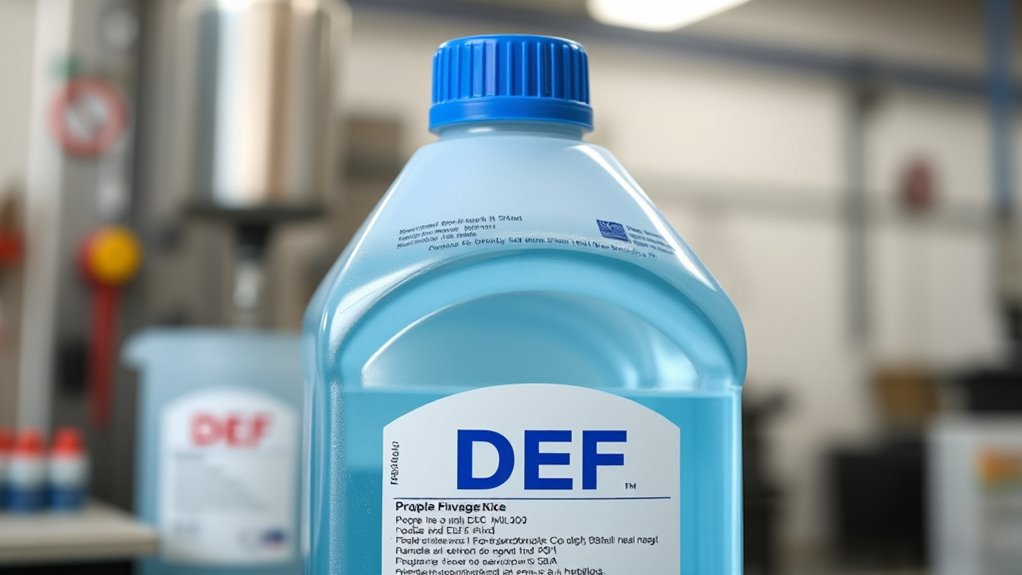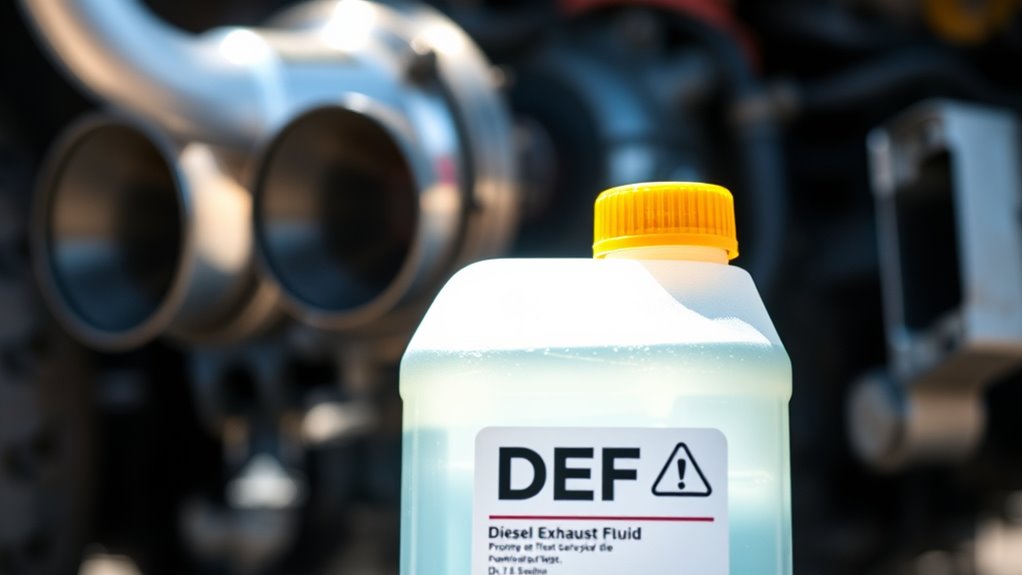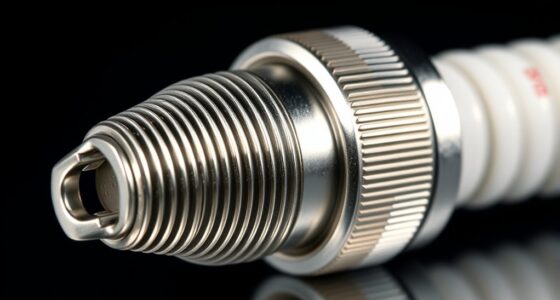Properly handling Diesel Exhaust Fluid (DEF) is essential for your diesel vehicle’s emissions compliance and performance. Always store DEF in sealed, clean containers away from extreme temperatures and contamination. Use high-quality, certified DEF from reputable sources, and follow manufacturer instructions for refilling. Handle DEF carefully, wearing gloves and avoiding spills, to prevent damage to your SCR system. Keep an eye on levels, and check conditions regularly—if you stay informed, you’ll ensure your vehicle runs smoothly and remains eco-friendly.
Key Takeaways
- DEF is vital for reducing diesel engine emissions and ensuring compliance with environmental regulations.
- Use high-quality, certified AdBlue to maintain engine performance and prevent system damage.
- Store DEF in sealed, cool, dry containers away from sunlight and extreme temperatures to preserve its effectiveness.
- Handle DEF carefully with gloves and clean containers to avoid contamination and ensure proper system function.
- Regularly check and refill DEF to prevent engine warning lights, derates, and costly repairs.

Have you ever wondered how modern diesel engines stay compliant with emission standards? The answer lies in Diesel Exhaust Fluid, or DEF, which is vital for reducing harmful emissions. To guarantee your vehicle operates efficiently and environmentally responsibly, paying attention to AdBlue quality is essential. AdBlue is the primary component of DEF, and using a high-quality product helps maintain peak engine performance while meeting strict regulations. Poor-quality DEF can cause clogging, reduce catalyst effectiveness, and even lead to engine damage. Hence, always choose reputable suppliers and verify the DEF you use is certified and meets industry standards.
Handling DEF properly isn’t just about using quality product; it’s also about safe storage. DEF is sensitive to contamination and temperature fluctuations. If it’s stored improperly, its effectiveness diminishes, and it can cause issues in your vehicle’s SCR (Selective Catalytic Reduction) system. That’s why DEF storage safety is vital. Always keep your DEF containers sealed tightly and store them in a cool, dry place away from direct sunlight and extreme temperatures. Avoid exposing the fluid to freezing conditions, as freezing can cause the container to burst or the DEF to degrade. When filling your vehicle, verify the cap and fill point are clean to prevent dirt and debris from contaminating the DEF. Contaminated DEF can clog filters and impair the SCR system, leading to costly repairs and downtime.
Furthermore, you should be aware of the importance of proper handling procedures. Wear gloves and eye protection if you’re transferring DEF manually, and always follow manufacturer instructions for storage and refilling. Never mix DEF with other chemicals or use expired product, as this can compromise its quality and your vehicle’s emissions compliance. Regularly check the DEF level and refill promptly to prevent running low, which can trigger warning lights or engine derates. Additionally, regular maintenance and diagnostics can help detect issues early and ensure your DEF system functions correctly. When purchasing DEF, opt for containers that are clearly labeled and verify they are stored upright to prevent leaks and spills.
Frequently Asked Questions
Can DEF Freeze in Cold Climates?
Yes, DEF can freeze in cold weather. When temperatures drop below 12°F (-11°C), DEF can freeze, affecting your vehicle’s performance. To prevent issues, make certain proper DEF storage in insulated containers or heated tanks. If your DEF freezes, simply allow it to thaw naturally or warm it gently before use. Keeping DEF warm in cold climates helps maintain its effectiveness and ensures your vehicle runs smoothly.
How Long Does a Typical DEF Refill Last?
A typical DEF refill lasts around 3,000 to 5,000 miles, depending on your vehicle’s usage. The DEF shelf life is usually about a year, but it can degrade if exposed to extreme temperatures or contaminants. You should check your vehicle’s refill indicator regularly and top off the DEF as needed to prevent issues. Frequent refills help maintain ideal emissions performance and ensure your engine runs smoothly.
Are There Any Health Hazards With DEF Exposure?
You might wonder if DEF exposure poses health risks. The truth is, chemical exposure to DEF is minimal and generally safe when handled properly. However, direct contact with the fluid can cause minor skin or eye irritation. Always wear gloves and goggles during handling to avoid unnecessary risks. While serious health hazards are rare, staying cautious guarantees you won’t unknowingly face hidden dangers lurking in accidental exposure.
Can DEF Be Mixed With Other Automotive Fluids?
You shouldn’t mix DEF with other automotive fluids because of chemical compatibility issues. Mixing can cause dangerous reactions or damage to your vehicle’s emissions system. Always follow storage precautions by keeping DEF in a cool, dry place away from contaminants and incompatible chemicals. If you need to add or handle DEF, use dedicated containers and avoid mixing it with fuels, oils, or cleaning agents to guarantee safety and proper function.
What Is the Environmental Impact of DEF Disposal?
You should be aware that improper disposal of DEF can harm the environment due to its chemical components. To minimize impact, opt for eco-friendly disposal methods and participate in DEF recycling programs. By doing so, you prevent contamination of water sources and reduce pollution. Always follow local regulations and guidelines for safe disposal, ensuring that DEF is handled responsibly and contributes to environmental protection efforts.
Conclusion
Remember, handling diesel exhaust fluid properly is key to keeping your vehicle running smoothly and protecting the environment. Always follow the recommended storage and usage guidelines, and never ignore signs of low DEF levels. As the saying goes, “A stitch in time saves nine.” By staying attentive and proactive, you guarantee your vehicle stays efficient and eco-friendly, avoiding costly repairs or penalties. Proper DEF management isn’t just a duty—it’s a smart choice for your car and the planet.









